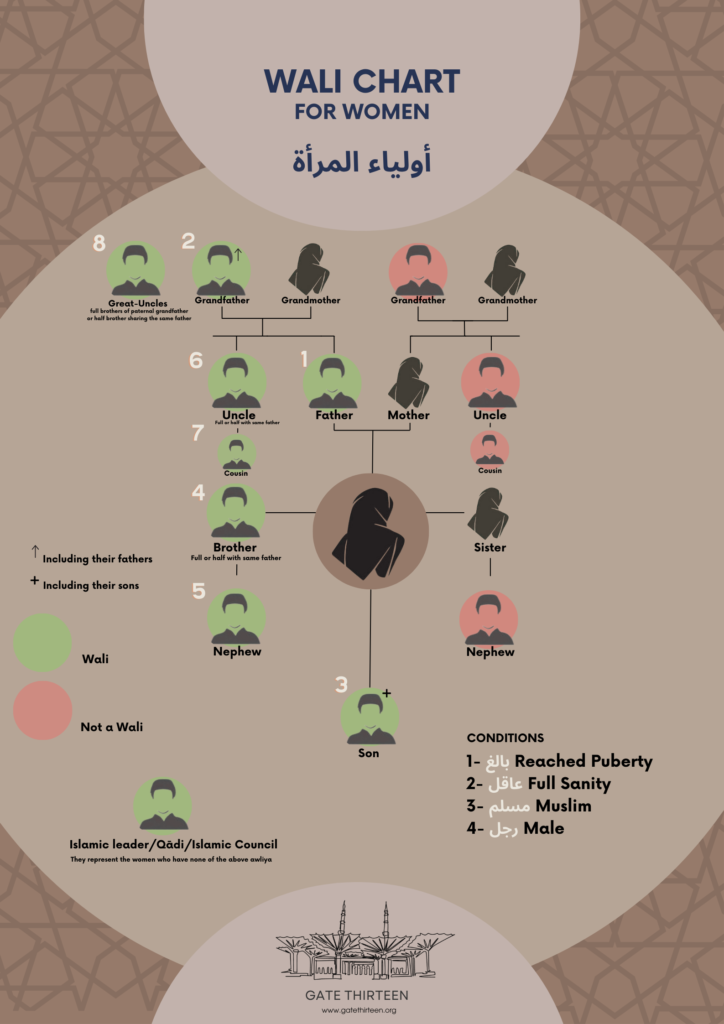A woman’s wali or legal guardian is defined in Islam as:
هو الذي يلي أمر المرأة في عقد النكاح من عصبة المرأة وهم أولياؤها الذكور الذين يرثونها
The one who represents a woman in her marriage contract from her male inheritors.
This is specific to the male family members of a women from her father’s side only. This does not include the male relatives from the mother’s side.
Therefore, it is important to make a distinction between a woman’s mahram and her wali, as these are two terms that are not interchangeable, nor do they share the same rulings. And this is because not every mahram is a wali, and not every wali is a mahram, i.e., there are men who are able to be a woman’s wali that are not from her mahārim, like her cousins, and there are men who are her mahārim that cannot be her wali, like her maternal grandfather and maternal uncles.
What is a Wali’s role?
The Wali of the woman who is loosely translated as her guardian should take the responsibility of representing her during the time of her Nikah. The Wali needs to take her permission if she is a virgin before taking the final decision concerning her marriage or take her counsel and approval if she is a non-virgin.
The evidences for this include;
عَنِ ابْنِ عَبَّاسٍ: قَالَ رَسُولُ اللَّهِ ـ صلى الله عليه وسلم ـ لاَ نِكَاحَ إِلاَّ بِوَلِيٍّ
It was narrated that Ibn Abbas said: “The Messenger of Allah said: ‘There is no marriage except with a guardian.’
عَنْ عَائِشَةَ أَنَّ رَسُولَ اللَّهِ صلى الله عليه وسلم قَالَ ” أَيُّمَا امْرَأَةٍ نُكِحَتْ بِغَيْرِ إِذْنِ وَلِيِّهَا فَنِكَاحُهَا بَاطِلٌ فَنِكَاحُهَا بَاطِلٌ فَنِكَاحُهَا بَاطِلٌ
Aishah narrated that: The Messenger of Allah (ﷺ) said: “Whichever woman married without the permission of her Wali her marriage is invalid, her marriage is invalid, her marriage is invalid.
عَنْ أَبِي هُرَيْرَةَ قَالَ: قَالَ رَسُولُ اللَّهِ صَلَّى اللَّهُ عَلَيْهِ وَسَلَّمَ: لَا تُنْكَحُ الْأَيِّمُ حَتَّى تُسْتَأْمَرَ وَلَا تُنْكَحُ الْبِكْرُ حَتَّى تُسْتَأْذَنَ. قَالُوا: يَا رَسُول الله وَكَيف إِذْنهَا؟ قَالَ: أَن تسكت
Abu Hurairah reported the Messenger of Allah (ﷺ) as saying, “A previously married women must not be married till she is consulted, and a virgin must not be married till her permission is asked.” When asked how her permission was indicated he replied that it was by her saying nothing.
Who is a woman’s Wali?
The scholars state that there is a chorological order for the awliya. Meaning in the absence of the one who holds the right to wilaya it is then given to the one who is next in line.
There is a slight difference of opinion amongst the different madhāhib with regards to this order, but this list will be in reference to what is widely cited amongst contemporary scholars such as Shaykh Ibn Uthaymeen, Shaykh Ibn Bāz etc. رحمهم الله
- Father
- Paternal Grandfather or great-grandfather
- Sons
- Grandsons +
- Full Brothers
- Half-Brothers (same father)
- Nephews (sons of full brother)
- Nephews (sons of half-brothers)
- Full Paternal Uncles (same father and mother)
- Half Paternal Uncles (same father)
- Cousins (sons of full paternal uncles)
- Cousins (sons of half paternal uncles)
- Paternal Great-Uncles
- Sons of paternal great-uncles
- Then whoever is closely related as is the case in inheritance
- Muslim leader/Qādi/Islamic Council
In the absence of the above-mentioned relatives or in the case they all refuse to marry off a woman without legitimate reason, the Qādi/Islamic council assumes the role of the wali.
Some scholars put in the second position, anyone whom the father has appointed to act as wali on his behalf before his death.
This list is in order of priority, meaning anyone further down the list cannot assume the role of wali in the presence of someone higher up in the list, unless they do not fulfill the conditions of wilaya.
Conditions of a Wali
- Male
Therefore, it is not permissible for a woman to assume the role of wali. The evidence for this is the hadith of the Prophet:
عَنْ أَبِي هُرَيْرَةَ - رضى الله عنه - قَالَ: قَالَ رَسُولُ اَللَّهِ - صلى الله عليه وسلم - لَا تُزَوِّجُ اَلْمَرْأَةُ اَلْمَرْأَةَ, وَلَا تُزَوِّجُ اَلْمَرْأَةُ نَفْسَهَا
Narrated Abu Hurairah: Allah’s Messenger (ﷺ) said: “A woman may not give a woman in marriage, nor may she give herself in marriage.”
- Muslim
Therefore, a non-Muslim cannot represent a Muslim woman in marriage. This is because the scholars state that there is no guardianship of a non-Muslim over a Muslim.
So, in the case all of a woman’s close blood relatives are non-Muslims, then the Islamic authority (ruler or judge) would act as a Wali for her. In a non-Muslim country, the Islamic councils or institutions carry out the duties of an Islamic judge and so becomes the woman’s wali. The evidence for this is the hadith of the Prophet:
عَنْ عَائِشَةَ: قَالَ رَسُولُ اللَّهِ ـ صلى الله عليه وسلم ـ ” لاَ نِكَاحَ إِلاَّ بِوَلِيٍّ وَالسُّلْطَانُ وَلِيُّ مَنْ لاَ وَلِيَّ لَهُ”.
It was narrated that Aisha said: “The Messenger of Allah said: ‘There is no marriage except with a guardian.’ “And the ruler is the guardian of the one who does not have a guardian.”
- Puberty
- Sanity
Al-Wakalah in Nikah
Appointing someone in place of the wali is allowed if the one who holds the right to wilaya appoints someone else to represent him in his place. They can appoint anyone who fulfills the above-mentioned conditions even if they are not from the list of the awliya. For example, a father can appoint a maternal grandfather or maternal uncle in his place. The only condition is that they mention who they are representing in the contract (i.e., “I accept on behalf of so and so”).

